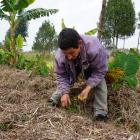Agroecology as a Way of Life (Brazil)
Agroecology as a Way of Life (Brazil)
In this chapter from the virtual exhibition “Global Environments: A 360º Visual Journey,” Claire Lagier’s 360º video shows six-year-old agroforestry projects in a land reform settlement in the state of Paraná, Brazil. Her research focuses on agroecological rural social movements in this region.











